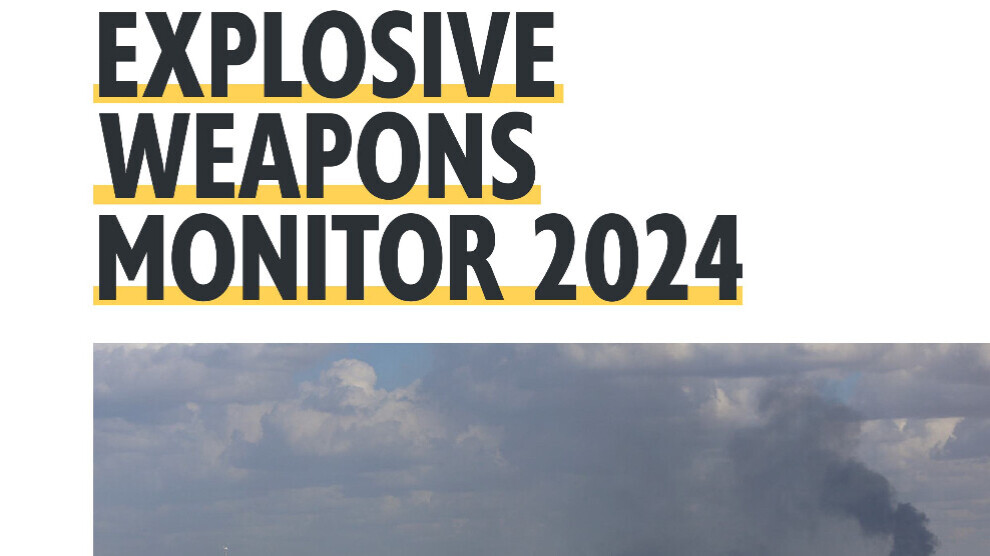New report finds alarming levels of civilian harm from the use of explosive weapons in 2024
In towns and cities across the world in 2024, civilians continued to experience alarming levels of harm from the use of explosive weapons.
In towns and cities across the world in 2024, civilians continued to experience alarming levels of harm from the use of explosive weapons.

Civilians continued to bear the brunt of bombing and shelling in towns and cities across the globe in 2024. Worldwide, civilians and civilian infrastructure were harmed by explosive weapons used by state and non-state actors in 74 countries and territories, a new report by the Explosive Weapons Monitor has revealed.
According to the Explosive Weapons Monitor 2024, continued heavy bombardment in Gaza, as well as extensive use of explosive weapons in Lebanon, Myanmar, Sudan, Syria, Ukraine and elsewhere, has resulted in thousands of civilian deaths and the reverberating, long-term effects of people losing safe access to healthcare, education, aid and food security.
“Civilians are paying the ultimate price when explosive weapons are used in populated towns and cities. We see a worrying pattern of harm caused by the use of explosive weapons in ongoing conflicts that extends well beyond the area of attack,” said Katherine Young, Research and Monitoring Manager of the Explosive Weapons Monitor.
“Not only do explosive weapons kill and injure civilians, they also cause damage to schools, health facilities, power lines, water supplies and other essential infrastructure which can last long after conflicts have ended. This inflicts further, long-term suffering on populations whose lives have been made unbearable while under bombardment,” she said.
Civilian deaths from explosive weapons in Palestine represented almost two-thirds of all those reported across the globe in 2024, remaining persistently high following a year of unprecedented civilian death and injury in 2023. In the rest of the world, civilian deaths from explosive weapons rose by more than half compared to the previous year, with notable increases in Lebanon, Myanmar, Syria and Ukraine.
The report also shares that attacks with explosive weapons on civilian infrastructure and essential services rose sharply in 2024. The use of explosive weapons in attacks on healthcare increased by 64 percent from the previous year, damaging and destroying health facilities and ambulances and killing health workers.
Likewise, the use of explosive weapons in attacks on education more than doubled, and attacks on humanitarian aid occurred nearly five times more frequently in 2024. In contexts of conflict worldwide, the Explosive Weapons Monitor report also shows that the use of explosive weapons has ongoing effects on civilians:
In Ukraine, three years of conflict have devastated its healthcare system. Attacks on Ukraine’s power and energy infrastructure, and repeated attacks on many health facilities, have impeded access to healthcare and endangered health workers and patients.
In Myanmar, record-high internal displacement and continued attacks on schools, universities and other education infrastructure have caused learning interruptions spanning pre-primary school to higher education, which have long-term impacts on job prospects, livelihoods and mental health.
As the number of people in Sudan in need of humanitarian assistance increased to nearly 25 million at the end of 2023, aid agencies scaled down programmes and evacuated staff because of increased insecurity and risk of harm from explosive weapons.
In Syria, the United Nations estimates that nearly 15.4 million Syrians are at immediate risk of death and injury from explosive remnants of war as civilians return to towns, villages and agricultural land, and as civilian deaths increase from landmines and other unexploded ordnance.
Given the scale of harm to civilians in 2024, the report shows that it is critically important for states to reduce harm to civilians and the infrastructure they depend on. To do so, states should endorse and implement the 2022 Political Declaration on Strengthening the Protection of Civilians from the Humanitarian Consequences of the Use of Explosive Weapons in Populated Areas.
This international agreement to protect civilians from the devastating effects of explosive weapons in urban areas has been endorsed by 88 countries so far.
“States must refuse to normalise the devastating toll of explosive weapons on civilians. By signing the political declaration, states are sending a clear message that harm to civilians, and destruction of the infrastructure they need to survive, will not be tolerated,” said Alma Taslidzan, Disarmament and Protection of Civilians Advocacy Manager at Humanity & Inclusion.